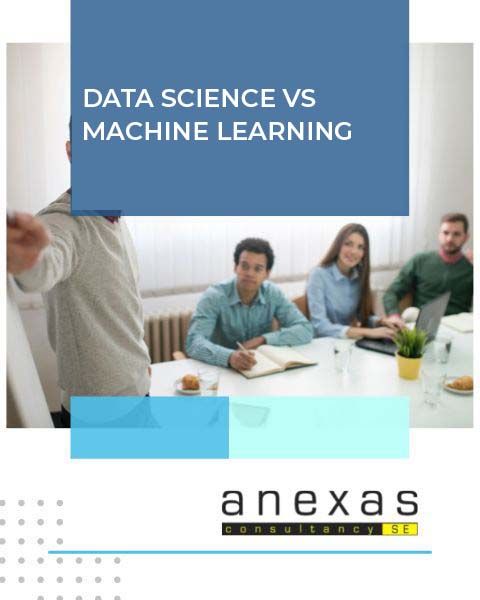Data Science vs Machine Learning
Data Science and Machine Learning are both high in demand in the fields of data, big data, and technology. All organizations are including data scientists to improve their performances and the data scientists use both, data science and machine learning to use data in the growth of the organization.
Data Science and Machine Learning are used to improve products, services, and systems using data. Both are highly paid careers. While Data Science and Machine Learning are interrelated, Machine Learning is an arm of Artificial Intelligence. Programming and statistics are studied and used in both fields.
In this article, we will discuss a detailed comparison between Data Science and Machine Learning, focusing on skills, tools, courses, and career opportunities.

Difference between Data Science and Machine learning
The main difference between Data Science and Machine learning is that Data Science is a field of study, to study data and extract its meaning for business decisions. While Machine Learning is a method to develop a model based on algorithm which can help in improving performance of organizations. Machine learning is subset of Data Science.
What is Data Science?
Data Science is a multidisciplinary field that studies data and takes out meaningful information to use in business decisions. In Data Science, data is collected, stored, processed, analyzed, and presented. It is given to stakeholders in a business, government agency, or other organizations to draw conclusions on how to improve their products or services. There are top domains that are benefiting from data science like healthcare, e-commerce, financial services, government sectors, etc.
To understand what data science does and its various aspects, a basic knowledge of computer science, mathematics, and statistics is required. With a zest to work with big data and work on new ideas every day, you can go a long way in your career.
Skills required in Data Science
- Knowledge of maths, computer science, and statistics.
- Working with big data, structured, unstructured, and semi-structured data.
- Understanding of programming languages like Python, R, Java, etc.
- Communication skills, teamwork, and presentation skills.
- Knowledge of Machine Learning and Deep learning.
- Skills like data visualization, data wrangling, data analyzing, etc.
- Understanding the business; its core, products or services, working system, motive, and future plans.
- Familiarities with collecting, processing, and storing data.
Career in Data Science
Data Science is one of the top career choices with many positions to offer. It is best suited for science and business professionals. A few data science jobs are listed below:
Data Scientists
Data Scientists are involved in studying data as well as business for an organization to use the information in decision-making. Generally, they ask questions to be answered, find future trends, and write algorithms for the system.
Data Analysts
Data Analysts analyze the data to find answers for businesses. A huge part of their job is to perform different analyses of data, like predictive analysis, to find patterns.
Data Engineer
Data Engineers work on the initial levels of data science departments. Their job is to collect data from various sources and convert raw data into information for data scientists to use.
Data Architect
Data Architects work on the infrastructure of a business or organization, to manage and store data in the system.
Statistician
Statticians extract information from data clusters and develop new methods for engineers to apply in their process.
Business Analysts
Business Analysts are directly involved in taking actions as per data insights and are responsible for business growth.
Data Science is a very large field that doesn’t stop here. To know more about data science and learn how to be a part of this world, watch this video:
What is Machine learning?
Machine Learning is a branch of Artificial Intelligence, which has vast use across different fields including data science. In data science, it extracts data and finds patterns using algorithms. It also develops different models to analyze data and predict future trends. For example, social media platforms use machine learning methods to understand customer behavior to suggest products, services, and other things available on social media to users.
Skills required in Machine learning
- Understanding of computer science.
- Working with data structure, data architecture, and algorithms.
- Skilled in software engineering.
- Skilled in system development.
- Working knowledge of programming languages like Python, R, etc.
- Knowledge of data modeling and data analysis.
- Understanding the business; its infrastructure, system, and requirements.
Career in Machine learning.
Machine Learning is useful in many disciplines, making it high in demand. A few data science jobs are listed below:
Machine Learning Engineer
Machine Learning Engineers build and manage platforms for machine learning projects.
NLP Scientists
Natural Language Processing Scientists work building and imitating human behavior on computers.
Human-Centered Machine Learning Designer
Human-Centered ML designers design, develop, and deploy systems that learn from humans.
BI Developers
Business Intelligence Developers analyze data sets and market trends.
Computational Linguists
They teach computers to understand human language.
Which is a better career option for you- Data Science or Machine Learning?
Choosing a career between Data Science and Machine Learningis easy after reading this article. You can make a list of your skills, your educational qualification, and check job roles in both fields to decide which career path is best for you. As we know both careers are in demand and highly paid. For both fields, you require knowledge of programming and statistics, familiarity with Python and SQL, an understanding of different tasks with data, and building models using machine learning.
Let us discuss Data Science vs Machine Learning with a comparison table
| Data Science | Machine Learning | |
| Motive | Study of data for business use. | Development of methods to use data. |
| Skills | Mathematics, Statistics, and Computer Science. Data collection, cleaning, mining, visualization, analysis, etc. Programming Languages Python or R. | Computer Science and Statistics. Data analysis and modeling. Programming languages Pyhton or R. |
| Tools | Python or R, Hadoop, Statistics, etc. | Python or R, Statistics, etc. |
| Data | Structured, semi-structured, or unstructured data. | Works with structured data. |
| Result | report | ML model |
If you have machine learning skills and want to work in data science fields, you can look into Data Science Beginner Level , Intermediate Level , and Advanced Level courses and start your career in data science.
Conclusion
Data Science is a study of all types of data to extract information that helps organizations take business decisions. Machine Learning is building methods to use data for improving performance and informing future trends. Machine learning is a branch of AI but is also an integral part of data science. Both fields are popular among businesses and offer high-paying jobs. In Data Science vs Machine Learning you can choose the one based on your skills, qualifications, and career expectations. The commonality between these two is working with data, understanding business, and using machine learning models.
FAQS
Is Machine Learning a part of Data Science?
Yes. Machine Learning is an integral part of data science. It is used by data scientists to build models that improve performance and inform future trends using data.
Does the Data Science syllabus cover Machine learning?
Yes. data science syllabus covers the study of machine learning, the tools used in building models, and also the practical applications of it. However, if you are a non-programmer, you can opt for a course design just nonprogrammers. Check this course: https://anexas.net/course/data-science-course-for-beginners/
How is machine learning different from data science?
Data science is the study of data that results in reporting findings for decision-making whereas machine learning is building models to use the data for improvement.
Which is better, Data Science or Machine Learning?
It depends on individual skills, career orientation, and experience to choose between data science and machine learning. Both fields are in demand and offer high salaries.
Do all Data Scientists use machine learning?
No. all data scientists don’t use machine learning but it is beneficial if they have a basic knowledge of it.
Which is better, a data scientist or a machine learning engineer?
Data Scientist. Data Scientists have a bigger responsibility in an organization, where machine learning is a part of the overall field. Therefore, they are paid more and hold the more prestigious position.
Does Machine Learning require coding?
Yes, coding is required in the field of AI and machine learning. It is essential in building models and developing systems.
Which is better, data science or artificial intelligence?
Data Science. Data Science is a huge field with multiple techniques where AI uses computer algorithms.
Which language is best for machine learning?
Python. In the past few years, Python has taken over other languages like C, C++, Java, and R to become the most popular choice in machine learning.
Can AI replace data science?
No, AI cannot replace data science as it is a larger discipline and involves an in-depth understanding of data. Instead, AI can become an integral part of data science to make the models and outcomes better.





